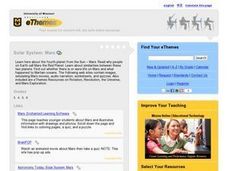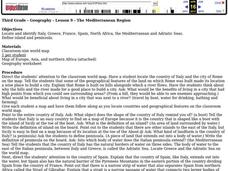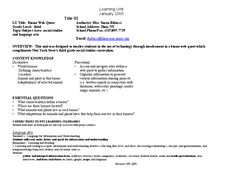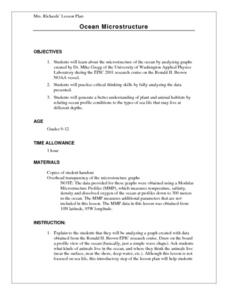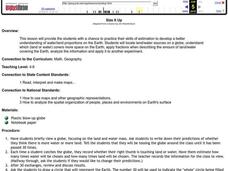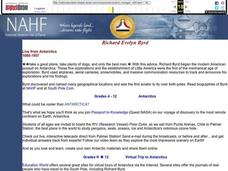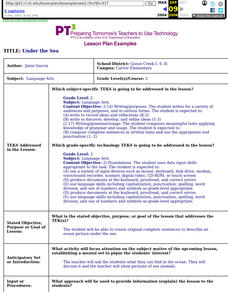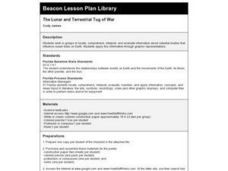Curated OER
The Earth is an Orange
Students examine and identify the various types of maps. Using two types of maps, they compare the data that can be gathered from each one. They also identify and locate the continents and the oceans. They review the purposes of each...
Curated OER
Is There Seaweed/Algae in Your Food?
Young scholars discover that seaweed/algae is a small part of the resources the oceans provide. By investigating common household products, students discover that human senses are not enough to detect the presence of seaweed/algae in food.
Curated OER
National And International
Learners participate in a series of geography lessons in which they identify the meaning of national and international. They discover the regions of the US after identifying the planet on which they live, the continents, the oceans and...
Curated OER
Earth Processes
Fourth graders explore and discuss the process of evaporation. They discuss how wet things become dry. Students observe the process of evaporation and they make predictions about the observations they make about evaporation. Students...
Curated OER
Visual Arts: Using Imagery
Students extend the colors, shapes, textures and lines of an unknown composition to create perspective in their drawings. Using oil pastels, they work in pairs to create a long continuous artwork of imagery inspired by sailing vessels...
Curated OER
Writing about the world's fisheries (Calibrated Peer Review)
Students summarize the findings of the Pew Ocean Commission report "America's Living Oceans," contrast it to an opposing viewpoint, and recommend a fisheries policy based on their understanding. It includes a scoresheet that was created...
Curated OER
Chemical Composition Chart
In this Earth's crust worksheet, students determine the most abundant and least abundant elements in the atmosphere, oceans, and crust. This worksheet has 1 fill in the blank and 11 short answer questions.
Curated OER
Going for the Green
Students use satellite imagery to obtain information on chlorophyll concentration at selected locations in the Earth's oceans.Students explain the relationship between chlorophyll concentration and primary production.Studen
Curated OER
What's Down There
Third graders gather and examine samples from the school outdoor environment. They compare/contrast their samples with those of other students. Students record the results of their observations.
World Wildlife Federation
Food Chains and Food Webs
As part of a study of food chains and food webs, class members complete a series of worksheets that trace a marine chain from producers to consumers or decomposers. After studying a food chain example, young marine biologists make up...
Curated OER
Solar System: Mars
Young scholars research Mars, read why it is called the Red Planet and find out whether there is or was life on Mars.
Curated OER
Tracing Our Own Family Pilgrimages
Students observe a world map and are introduced to vocabulary like: cities, continents, rivers, lakes, and oceans. They discuss the names of the cities they live in and locate them on the map; then using a colored pushpin indicate: the...
Curated OER
Geography
Third graders study the Mediterranean Region by locating and identifying Italy, Greece, France, Spain, North Africa, the Mediterranean and Adriatic Seas.
Curated OER
Biome Web Quest
Third graders create paper mache globes, paint them and label the oceans and the continents. In groups, they research a biome, write about it and create an artistic visual representation of the biome and present it to the class.
Curated OER
Ocean Microstructure
Students assess the ocean's microstructure by analyzing graphs created during tne Ronald H.Brown research cruise. they discuss at what depths various sea animals live and write paragraphs on data analysis from the graphs.
Curated OER
Size It Up
Students practice their math skills in determining the water/land proportions of the Earth. Using globes, they locate the seven continents and oceans and determine which covers more space. They use this information to participate in...
Curated OER
Richard Evelyn Byrd: Live from Antarctica
Students explore Richard Evelyn Bird and his flights over Antarctica. They conduct an online journey of the Polar Duke to discover where to study penguins, seals, oceans, ice and Antarctica's ozone hole. They create their own Antarctic...
Curated OER
Under The Sea - Describing an Ocean Picture
Second graders create original complete sentences to describe an ocean picture under the sea. After a lecture/demo, 2nd graders use a software program to create their own undersea scene, complete with pictures and writing.
Curated OER
How Harmful Is It?
Pupils complete a form that requires them to make decisions about how severely different types of marine debris affect people, animals, vessels, communities. Results are totaled and analyzed to determine which types of marine debris are...
Curated OER
Ocean Exploration Time Lines
Students investigate ocean explorations. They conduct Internet research, and create a chronological timeline of various ocean explorations.
Curated OER
The Lunar and Terrestrial Tug of War
Fourth graders, in groups, locate, comprehend, interpret, and evaluate information about celestial bodies that influence ocean tides on Earth. They apply this information through graphic representations.
Curated OER
SURFACE CURRENTS
Students identify five major ocean currents and identify the correlation between ocean circulation and prevailing winds.
Curated OER
Storybook Art
Students read the book Swimmy, by Leo Lionni. They study his method of illustrating and then create an underwater scene of their own using the same method.
Curated OER
Paper Collage With Eric Carle
Students examine the illustrating work of Eric Carle. They discuss how the illustrations are made and then decorate their room by creating artwork in the same style.
Other popular searches
- Identify Oceans and Seas
- Oceans and Seas Maps
- Oceans and Seas Preschool
- Balm Oceans and Seas
- Oceans and Seas Worksheet
- Blm Oceans and Seas
- Major Cities/oceans/seas










